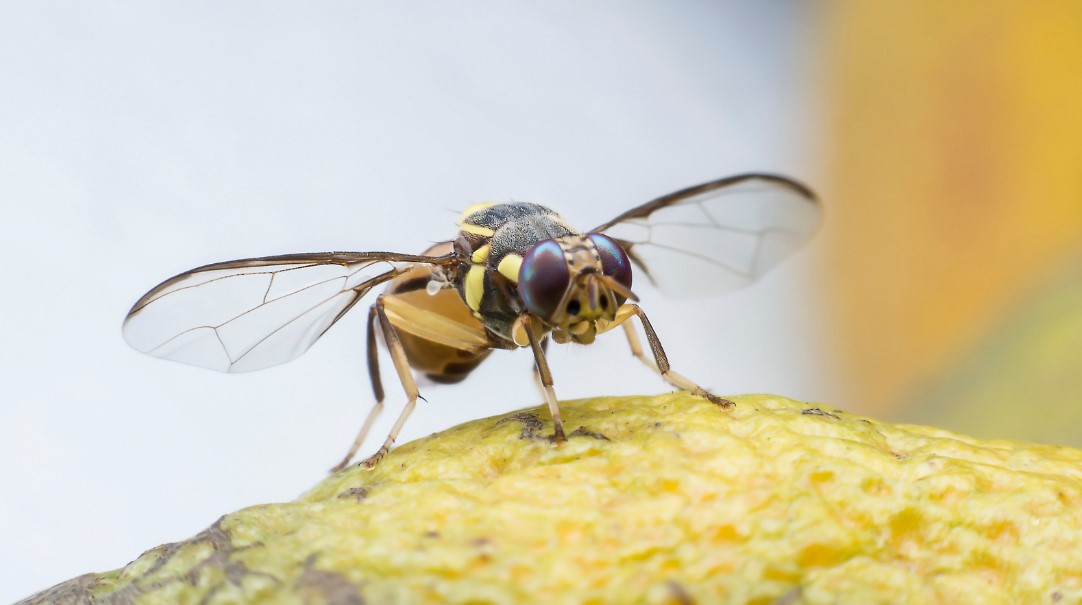Fruit flies are tiny, persistent insects that can quickly become a nuisance in our homes, especially in the kitchen. Attracted to ripening fruits, vegetables, and sugary liquids, these pests can rapidly reproduce, turning your space into an unwelcome buzzing zone.
In this guide, we’ll explore how to get rid of fruit flies, from homemade traps to preventative measures, to help you eliminate fruit flies for good. Reclaim your kitchen and enjoy a fly-free environment with our tips and tricks. Let’s dive in and bid farewell to these annoying pests!
What Are Fruit Flies and Why Do They Infest Homes?
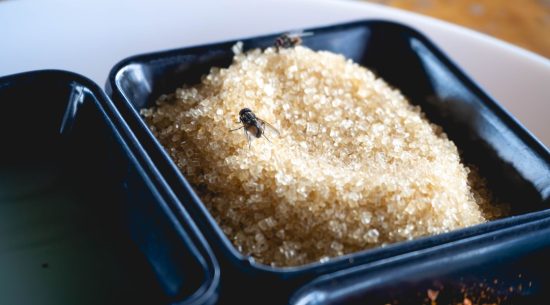
Fruit flies, scientifically known as Drosophila melanogaster, are small flying insects that are commonly found in homes. These annoying pests are attracted to ripe or rotting fruits and vegetables. They have a keen sense of smell and can detect the aroma of overripe produce from quite a distance away.
So why do fruit flies infest our homes? Well, these sneaky critters are excellent at hitching a ride on fruits and vegetables brought into our kitchens. Even just one female fruit fly can lay up to 500 eggs at a time! Once inside your home, they quickly multiply and take over your kitchen in no time.
But it’s not just about food for fruit flies. They also seek out moist areas to breed. That’s why you often find them near drains, trash cans, or compost bins where there is plenty of moisture for their larvae to thrive.
While fruit flies may seem harmless, they can be quite bothersome when they start buzzing around your face while you’re trying to enjoy a meal or prepare food. Not only that, but having an infestation of fruit flies in your home can be unhygienic and unsightly.
How to Get Rid of Fruit Flies?
1. Cleanliness

Keeping your kitchen and dining areas clean is essential in the battle against fruit flies. These pesky insects are drawn to ripe or rotting fruits, so it’s crucial to remove any overripe fruit from your counters or store them properly.
Start by washing dishes promptly after use and wiping up spills immediately. Fruit flies are attracted to the scent of food, so keeping surfaces clean will deter them from infesting your kitchen. Additionally, make sure to take out the garbage regularly, as this can be a breeding ground for these tiny pests.
In addition to maintaining cleanliness in food preparation areas, it’s also important to pay attention to other potential hotspots for fruit fly infestations. Check drains, trash cans, and compost bins regularly and disinfect them thoroughly. Fruit flies lay their eggs in moist areas like these, so eliminating their breeding grounds is crucial.
By practising good hygiene habits and taking proactive measures against fruit flies, you can create an environment that is unwelcoming for these annoying insects. So roll up your sleeves and get cleaning – not only will you have a fresh kitchen but also a fruit fly-free home!
2. Eliminate Breeding Grounds
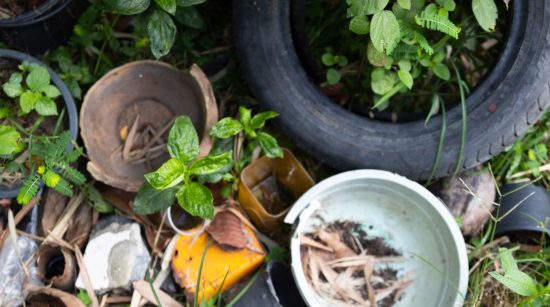
Eliminating breeding grounds is a critical step in effectively getting rid of fruit flies. Fruit flies are attracted to ripe fruits, organic matter, and moist areas where they can lay their eggs. To eliminate breeding grounds, it is important to maintain cleanliness and remove potential food sources.
Regularly clean drains using boiling water or vinegar and baking soda solutions to prevent fruit fly breeding. Ensure that trash cans are emptied and cleaned regularly to avoid attracting fruit flies with rotting food. Promptly dispose of any overripe or rotting fruits and clean spills on kitchen surfaces.
Properly manage compost bins by sealing them tightly and avoiding the addition of fruits or organic materials that may attract fruit flies. Additionally, address any areas with excess moisture and ensure proper ventilation to discourage fruit fly breeding.
By consistently implementing these practices, you can significantly reduce fruit fly breeding grounds and effectively control their population in your home.
3. Traps
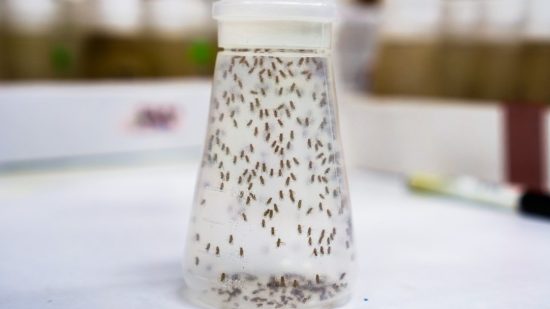
One effective way to get rid of fruit flies is by setting up homemade traps. These traps are simple to make and can help eliminate these pesky insects from your home.
To create your own fruit fly trap, start by finding a small bowl or jar. Fill it with a mixture of apple cider vinegar and add a few drops of dish soap. The scent of the vinegar acts as an attractant for the flies, drawing them towards the trap. Meanwhile, the dish soap breaks the surface tension of the liquid, causing the flies to sink when they come into contact with it.
Next, cover the bowl or jar tightly with plastic wrap and poke a few holes in it using a fork or toothpick. This will allow the fruit flies to enter but makes it difficult for them to escape once inside.
Place these traps near areas where you have noticed fruit fly activity, such as near overripe fruits or garbage bins. Monitor them regularly and empty any trapped fruit flies into soapy water to ensure they cannot escape.
By creating these DIY traps, you can effectively capture and eliminate fruit flies from your home without relying on harmful chemicals or pesticides.
4. Fruit Fly Repellents
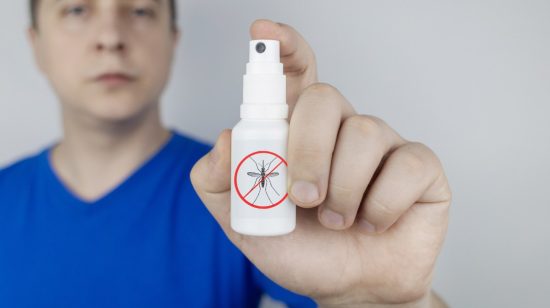
When combating fruit fly issues, explore natural repellents to deter and diminish their presence in your home.
Consider placing potted basil or mint near fruit bowls and countertops, as fruit flies find the strong herbal aroma disagreeable. Similarly, position dried bay leaves in areas frequented by fruit flies to discourage their presence.
Utilize muslin bags filled with dried cloves, hung strategically around fruit fly hotspots, or place cloves in bowls of water to repel them effectively. Additionally, create a natural spray using essential oils like peppermint, eucalyptus, or lavender mixed with water, and regularly apply it to areas where fruit flies are present.
While these repellents contribute to deterring fruit flies, their effectiveness is optimized when combined with other strategies, such as maintaining cleanliness and eliminating potential breeding grounds. Employing a comprehensive approach enhances your chances of successfully reducing fruit fly infestations in your home.
5. Natural Repellents

To ward off fruit flies naturally, consider using herbs like basil, mint, or bay leaves near fruit bowls, as they emit a strong scent that the flies find unpleasant. Another effective option is hanging muslin bags filled with dried cloves, as fruit flies are repelled by the smell. These natural repellents are simple, cost-effective, and contribute a pleasant aroma to your home.
While these methods are excellent for prevention, they may only partially eliminate larger infestations. For more extensive problems, it’s advisable to combine natural approaches with thorough cleaning and trapping techniques.
By integrating these natural deterrents into your routine, you can create an environment that keeps pesky fruit flies at bay without resorting to harsh chemicals.
6. Vacuuming

If fruit flies have invaded areas beyond your kitchen, such as living spaces or bedrooms, there’s a simple and effective solution – grab your vacuum cleaner. Attach the hose for precision suction, carefully manoeuvre near the fruit flies, and watch them get swiftly eliminated. Be patient and thorough, as it may take a few passes to capture them all.
Once the fruit flies are inside the vacuum cleaner, don’t forget a crucial step – empty the bag or canister immediately to prevent any chance of escape or re-infestation. Dispose of the contents far away from your home to ensure they’re gone for good.
Vacuuming is not only effective for eliminating visible fruit flies but also for removing their eggs and larvae from surfaces like carpets or furniture. By eliminating these potential breeding grounds, you’re taking proactive steps to prevent future infestations.
If fruit flies have ventured beyond the kitchen, your trusty vacuum cleaner can help you reclaim your living spaces. Say goodbye to those tiny winged intruders once and for all with this simple yet effective technique.
Preventing Future Infestations
To prevent future infestations in your home, implementing proper food storage practices is essential.
- Seal food items in airtight containers to deter pests like ants, cockroaches, and rodents from accessing and contaminating food sources. Store pantry staples such as grains, cereals, and pet food off the ground and away from walls to minimize accessibility for pests. Regularly check for expired foods and dispose of them appropriately to reduce attractants for unwanted critters.
- Additionally, keep kitchen surfaces clean and free of crumbs, spills, and food residues that can entice pests. Wipe counters, sweep floors, and clean spills promptly to eliminate potential food sources and nesting grounds for insects and rodents.
- Maintaining a clean kitchen environment is crucial in preventing infestations. Regularly empty and clean garbage bins, as leftover food scraps can lure pests. Ensure that trash is securely sealed and disposed of regularly to prevent odors that may attract pests. Seal entry points such as cracks, gaps, and crevices in walls, floors, and around pipes to block potential entryways for insects and rodents. Consider installing door sweeps, sealing window gaps, and repairing damaged screens to fortify your home against pest intrusion.
By incorporating these preventive measures into your household routine, you can safeguard your living space from future infestations and promote a healthy, pest-free environment.
Conclusion
Eliminating fruit flies requires a combination of cleanliness, traps, and proactive measures. Maintain a tidy kitchen, employ traps and repellents, and use a vacuum cleaner for effective removal. Stay vigilant in preventing future infestations by keeping living spaces clean and minimizing favourable conditions. Armed with these strategies, you can bid farewell to fruit flies and regain control of your home environment. Happy bug-busting!
FAQs – How to Get Rid of Fruit Flies?
Will fruit flies go away on their own?
No, fruit flies won’t disappear on their own. They breed quickly and need food sources like overripe fruit and decaying matter. Eliminating their breeding grounds and food sources is crucial.
What smell do fruit flies hate?
Fruit flies dislike strong smells like citrus, peppermint, clove, and lavender. However, these scents offer temporary deterrence, not elimination.
Are fruit flies harmful?
While not dangerous, fruit flies can carry bacteria from unsanitary areas onto your food. They’re also simply annoying due to their presence and buzzing.
Does spraying vinegar keep fruit flies away?
Vinegar traps attract and drown fruit flies, but they don’t repel them. Combined with other methods like removing food sources and using traps, they can be helpful.
Why won’t fruit flies go away?
Persistent fruit flies indicate an underlying issue – a hidden breeding ground like a dirty drain or forgotten food scraps. Thoroughly address all potential breeding sites and use a combination of removal and prevention methods for lasting results.

